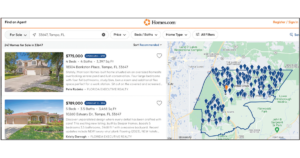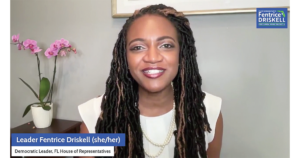
Despite eight hours of mostly negative public comments that dragged on until past 2 a.m. the next morning, the Hillsborough Metropolitan Planning Organization (MPO) voted on June 23 to keep the controversial Tampa Bay Express (TBX) project moving forward.
After listening to dozens of people both for and against the project at the Hillsborough County Center building in downtown Tampa, the MPO voted 12-4 in favor of keeping the $6 billion TBX plan in its Transportation Improvement Plan (TIP).
The TBX plan entails widening I-275, I-75 and I-4 with 91 miles of express (or toll) lanes, as well as potentially creating a rapid bus lane in the center median of those roadways and laying the groundwork for future rail projects. The road improvements, the Florida Department of Transportation (FDOT) and supporters said, would better connect the Tampa Bay area and help ease traffic congestion.
Opponents cited the high cost of the toll lanes, which will have variable costs, meaning the more traffic, the greater the cost of traveling in the express lanes. Some estimates say a rush hour trip from the Pinellas County side of the Howard Frankland Bridge to downtown Tampa could cost as much as $30. As a result, opponents have dubbed them “Lexus Lanes.”
But, most of the passion against the TBX plan came from residents of the historic Tampa neighborhoods of Seminole Heights, Tampa Heights and Ybor City, who say they will be displaced by the project. The plan affects mostly poor minority neighborhoods, as well as up to 100 local businesses that opponents believe will be destroyed by FDOT construction.
Lisa Montelione, the outgoing Dist. 7 Tampa City Council member whose area of representation includes New Tampa and USF, voted against TBX. MPO chairman Les Miller, Tampa City Councilman Guido Maniscalco and Hillsborough County Commissioner Kevin Beckner were the others who also voted against the project.
After the vote, Montelione addressed those remaining in the crowd, which once numbered more than 500 people, telling them to not be discouraged and applauding their efforts.
Opponents, many of whom voiced their distrust of FDOT and expressed concern over parts of the plan that had been kept secret, did get some measure of satisfaction, as the MPO unanimously passed amendments requiring more oversight and requesting reports of the human impact of the project.
A Wesley Chapel Perspective
Greater Wesley Chapel Chamber of Commerce (WCCC) CEO Hope Allen was pleased to see the TBX plan survive. She watched with hundreds of others in the lobby of the downtown Tampa City Center, and noted the intensity of the night.
Twice, Allen — who wore a sticker proclaiming her support of TBX — was badgered by anti-TBX folks, forcing her to change seats. “You must be one of those people from the suburbs,’’ one said to her.
Another woman walked by, pursed her lips and shook her head at Allen in disappointment.
“It’s tough in here,’’ Allen sighed.
The WCCC, along with the Pasco County Economic Development Council and the Pasco Board of County Commissioners (BCC), all have supported TBX, although the roads currently being discussed only go as far north as Bearss Ave., just south of New Tampa.
Construction could begin next year in Pinellas County, and could be completed by 2026. “We believe in connectivity with the communities around us,’’ Allen said. “Plus, these roads will have a direct impact on our residents because so many of them head that way into work. They will use (the highways), and the less time they spend in traffic, the more time they can spend at home.”
Pasco’s District 2 commissioner Mike Moore, who represents Wesley Chapel on the BCC, said his support of TBX was a quality of life issue for him.
“There’s no denying we have well over 50 percent of our residents traveling those roads to go work in Hillsborough and Pinellas counties,’’ Moore said. “If this will cut off two hours a day on the road in traffic, that’s more time with family and friends, and that’s important. And remember, people do come from other areas to Pasco County to work as well.”
Part of the TBX plan includes express bus lines, and Moore said Wesley Chapel (as well as New Tampa) would eventually be home to a station.
The TBX plan was supported by most of the area’s business leaders, as well as by Tampa Mayor Bob Buckhorn. Had the plan not passed on this vote, the county would have had to return the $6 billion in funding to the state.
Most local commuters into Tampa and St. Petersburg often complain about the long, congested rides into work, which can take hours.
“My wife and I moved out to New Tampa several years ago, because that’s where her job was,’’ Joe Farrell told the MPO. “She doesn’t work there anymore, but we stayed because that’s where the affordable housing was.”
Now that he works in Clearwater and has an 18-month-old son, Farrell said it is hard to find time for his family.
“My son wakes up at 7 a.m. and goes to bed at 7 p.m.,” Farrell said, “and most days I have to leave the house at 6:30 a.m. and I am driving like hell through I-275 to get home by 6:30 p.m., so I can spend some time with him. It’s frustrating.”




No comment yet, add your voice below!